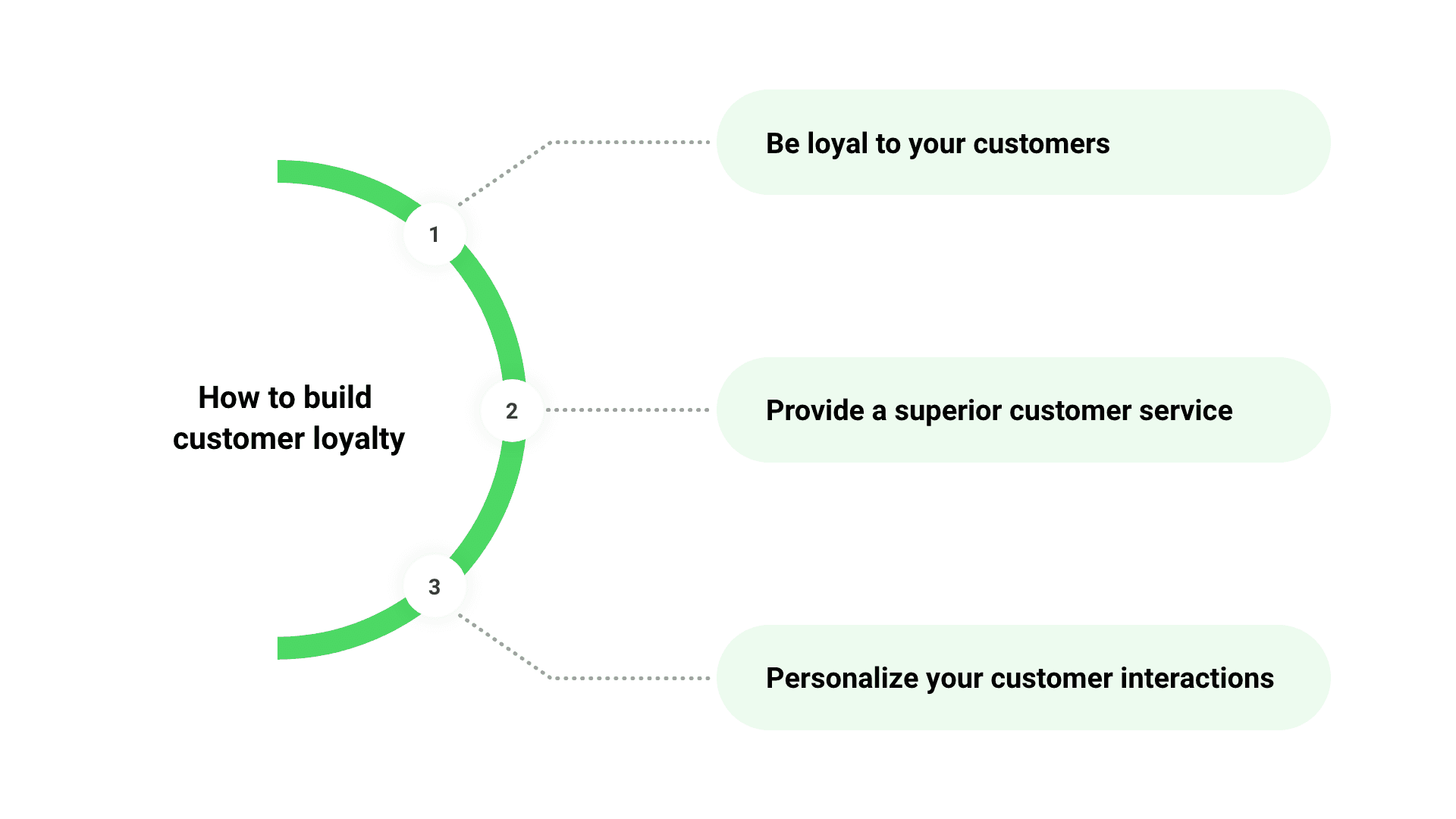Customer Loyalty: Everything You Need to Know About Building It
Strong customer loyalty is the key to a sustainable business. Learn our tips for building customer loyalty.
Getting new customers through the door is usually a priority for businesses. However, to succeed in the long-term, those customers need to stick around. As a result, customer loyalty is one of the factors that can make or break a business.
This article will cover the most important aspects of customer loyalty, including:
What is customer loyalty?
Why is customer loyalty important?
How to measure customer loyalty
How to build customer loyalty
Customer loyalty examples
What is customer loyalty?
Customer loyalty refers to when a customer has a positive impression of your company’s brand and will choose to purchase again from you rather than from your competitors. Unlike customer satisfaction — which can be based on a one-time purchase without factoring in the likelihood of future business — customer loyalty is built and displayed over time.
Rather than impulse purchases that are driven by price and convenience, a loyal customers will place a greater value on purchasing from a brand they know and trust to deliver a superior customer experience.
Why is customer loyalty important?
Far from just being a warm fuzzy feeling, customer loyalty management has real tangible benefits for your business. Loyal customers can help businesses cut costs, increase profits, and drive meaningful growth.
While many businesses try to compete on price, cultivating loyalty isn’t about offering the cheapest product, but offering the best overall experience. When customer loyalty is strong enough, they’ll happily buy from you even if it’s cheaper or more convenient to buy elsewhere.
For example, think about the last time you changed your mobile phone. According to one survey, over 90% of iPhone users intend to buy another iPhone the next time they upgrade. At the same time, 86% of Samsung users intend to buy another Samsung. While undoubtedly for some people this is to do with feeling tied into a brand, the vast majority are simply loyal to their chosen brand and won’t be swayed by lower prices or different features.

This kind of loyalty is even more of competitive advantage now, with customers having more options than ever before. When people’s shopping was limited to the town or city they lived in, customers had no choice but to be ‘loyal’ to the shops in that area. But today’s companies can’t afford to be complacent — if a customer feels that they’d get better service elsewhere, they’ll switch in a heartbeat.
As well as spending more themselves, loyal customers are also more likely to recommend you to others. In effect, this is another lead generation channel, one that’s highly effective. To go back to our mobile phone example, iPhone users are renowned for acting as brand ambassadors, fiercely arguing over the merits of the latest version with anyone who’ll listen. A personal recommendation from a trusted friend can be a more powerful influence on purchasing decisions than the fanciest marketing campaign, leading to yet more loyal customers.
How to measure customer loyalty
There are a few different ways to measure customer loyalty.
The most popular metric is Net Promoter Score (NPS). Customers are asked how likely they are to recommend your company to a friend/colleague, on a scale of 0-10, as a way of gauging their loyalty.
To get an idea of how loyalty is affecting your business, you can take a look at your customer retention rates and churn rates. As lagging indicators, these give you concrete numbers for how many customers stay or leave, as a tangible demonstration of their loyalty.
Finally, to see the financial impact, you’ll also want to consider metrics such as Customer Lifetime Value (CLV) and Customer Acquisition Cost (CAC). If customer loyalty isn’t high enough, you might find that it costs you more to acquire a customer than they end up spending with you.
How to build customer loyalty
While customer loyalty management is incredibly powerful, it’s not something that you can magically increase overnight. By definition, loyalty is characterized by firm and consistent support. There are no shortcuts — building customer loyalty takes time.
Having said that, there are certain actions that you can take today to start cultivating loyalty.

➜ Be loyal to your customers
It’s all very well expecting your customers to be loyal, but are you being loyal to your customers? Many businesses save their best offers for attracting new customers, without giving a second thought to rewarding their existing ones. It shouldn’t come as a surprise then when those clients keep switching suppliers.
It’s widely acknowledged that it’s cheaper to retain existing customers than attract new ones, so make it a point to reward loyalty.
➜ Provide a superior customer service
No matter how good your product is, sooner or later customers will need support. The way you offer that support will have a huge (and sometimes surprising) impact on their loyalty. In the book Alchemy: The Surprising Power of Ideas That Don’t Make Sense, Rory Sutherland points out that — if a customer has a problem and a brand resolves that to their satisfaction — the customer will become more loyal than if the fault had never occurred in the first place.
By investing in your customer service, you show that you’re committed to resolving your customers’ problems, not just making a profit. For example, rather than going through a long chain of emails to resolve an issue, it might be more appropriate to jump onto a voice or video call with a struggling customer to help them get the result they’re looking for. This helps build trust and create longer-lasting relationships.
➜ Personalize your customer interactions
Of course, you don’t have to wait for things to go wrong before you start talking to your customers. By focusing on personalized customer engagement throughout the customer journey, you can build stronger relationships.
For smaller businesses, it’s often easier to add the personal touch, like the small boutique store that includes a hand-written note thanking the person for their custom. Larger companies can also personalize their communication by using Customer Relationship Management (CRM) software to keep track of customers and their previous interactions.
Customer Loyalty Examples
It’s easy to talk about building customer loyalty, but what does it look like in practice? One of the most popular methods is creating a customer loyalty program.
What is a loyalty program?
A loyalty program is a structured plan for rewarding repeat purchases and long-term customers. This might be by awarding points that can be redeemed for discounts, offering a free product after a specified number of purchases, or a paid program that gives the customer additional perks.
The Sky VIP loyalty program offers better rewards depending on how long you’ve been a Sky TV customer, with customers of 15+ years getting the best offers.
Every McDonald’s coffee comes with a loyalty card built into the cup, making it easy and frictionless for customers. The card can then be used to claim a free coffee after you’ve collected enough stickers, with one sticker on each cup.
Amazon uses a paid loyalty program, Amazon Prime. For a monthly fee (or an annual fee at a reduced rate), customers get a wide variety of perks, including fast free delivery, music and video streaming, and access to additional members-only offers.
Conclusion
Loyal customers are essential for long-term success, helping businesses increase profits, cut costs, and enjoy organic growth. However, loyalty doesn’t happen automatically — it means understanding your customers, exceeding their expectations, and consistently providing outstanding service. By looking for ways to reward your best customers and offering a personalized service, you can turn one-time customers into loyal brand evangelists that will benefit your business for years to come.
Want more loyal customers?
SnapCall helps you offer a more personal service, allowing you to talk directly with your best customers over voice/video calls and screen sharing.



